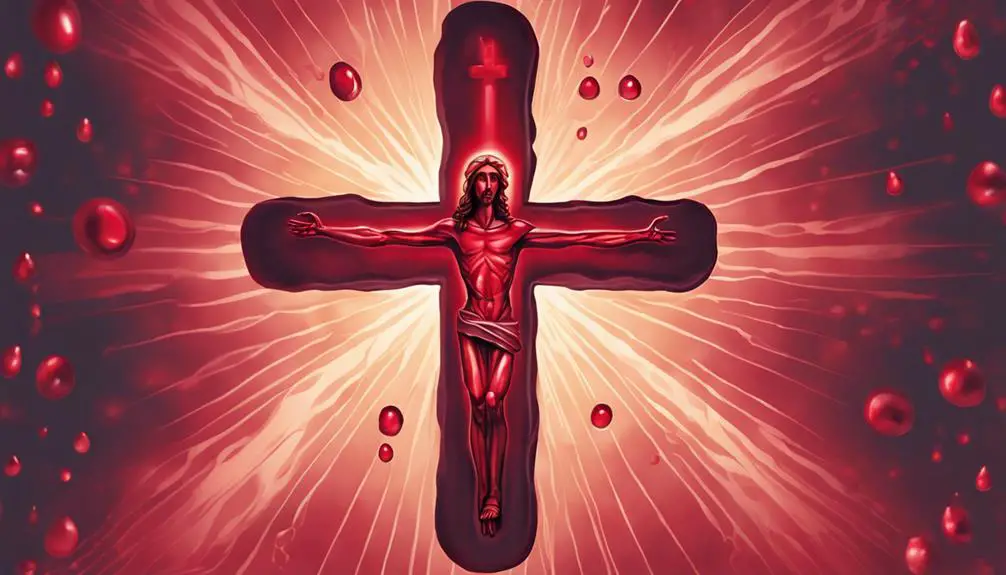Symbolizing grace and judgment, the number 5 in the Bible holds profound meanings that beckon deeper exploration—discover its secrets.

What Does the Number 5 in the Bible Mean
Consider the Pentateuch, the foundational five books of the Bible, which serve as a cornerstone for both Judaism and Christianity.
You've likely encountered the number 5 woven throughout biblical texts, but have you ever paused to ponder its deeper significance? From the five wounds of Christ to the grace manifested through five offerings, this numeral holds layers of meaning that extend beyond mere coincidence.
As we explore its symbolic presence in prophecy and vision, you'll discover how the number 5 shapes theological concepts and enriches our understanding of divine grace and judgment.
Let's uncover the layers together, shall we?
Key Takeaways
- The number 5 symbolizes grace and redemption, highlighting Christ's sacrifice for humanity.
- In prophetic contexts, 5 conveys divine messages and underscores spiritual significance.
- The Five Wounds of Christ demonstrate his humanity, divinity, and commitment to redemption.
- Symbolism of five enriches understanding of scripture and spiritual journeys.
The Torah's Quintet

The Torah, often referred to as the Pentateuch, encompasses the first five books of the Bible, symbolizing the foundational legal and ethical texts of Judaism. Traditionally, Mosaic authorship attributes these books to Moses, a central figure in Jewish tradition, who received divine revelations including the laws and the Tabernacle blueprint. This quintet forms the bedrock of Jewish religious laws and narratives, guiding the moral and social conduct of its adherents.
Analyzing the Torah, one finds the Tabernacle blueprint not merely as a set of architectural instructions but as a symbolic representation of the divine presence among the people. This aspect underscores the Torah's role in bridging the human and the divine, a theme central to its narrative and legal frameworks. The emphasis on Mosaic authorship, while debated among scholars, highlights the Torah's perceived direct linkage to the divine, reinforcing its authority and sanctity within Judaism.
In essence, the Torah's quintet, through its narratives and laws, including the detailed Tabernacle blueprint, serves as a foundational text shaping Jewish identity and practice. Its attributed Mosaic authorship further elevates its status, embedding it deeply into the spirituality and historical consciousness of the Jewish people.
Pentateuch: A Closer Look
Delving deeper into the Pentateuch, one frequently encounters layers of historical, religious, and ethical complexity that challenge and enrich our understanding of this pivotal text. Central to this exploration is the concept of Mosaic authorship, which suggests that Moses himself penned these first five books of the Bible. This notion not only underscores the Pentateuch's authority but also its intimate connection to the Israelites' covenant with God.
Aspect |
Significance |
|---|---|
Mosaic Authorship |
Serves as a testament to the authenticity and divine inspiration behind the Pentateuch's teachings. |
Covenant Significance |
Highlights the binding agreement between God and His people, with the Pentateuch acting as its foundation. |
Historical Context |
Provides insight into the life and trials of the ancient Israelites, offering a backdrop for the covenant's establishment. |
Ethical Teachings |
Encourages a moral framework based on the covenant, guiding believers in their daily lives. |
Through this analytical lens, you'll appreciate the Pentateuch's role in shaping the spiritual and ethical contours of Judeo-Christian tradition. Its emphasis on covenant significance not only reinforces the sacred bond between God and His people but also underscores the ethical imperatives that guide their conduct.
Five Wounds of Christ

In exploring the Five Wounds of Christ, you'll uncover a profound aspect of Christian symbolism that resonates deeply within the faith's history and theology. These wounds, received during the Crucifixion, are emblematic of the ultimate sacrifice for humanity's redemption. The significance of these injuries goes beyond physical harm, symbolizing the depth of Christ's love and the extent of his sacrifice for human salvation.
The Five Wounds consist of:
- The wound in his side, from which blood and water flowed, demonstrating the humanity and divinity of Christ.
- The wounds in his hands, where nails affixed him to the cross, signifying his enduring commitment to bear the weight of human sins.
- The wounds in his feet, also nailed to the cross, symbolizing the foundation of the Church's path to salvation.
- The crown of thorns on his head, reflecting the scorn and rejection of the world yet bearing a royal significance in suffering.
Each wound carries with it layers of Redemption symbolism, inviting believers to contemplate the Crucifixion's significance not just as an event in history but as the very embodiment of divine love and sacrifice.
Grace Through Five Offerings
Exploring further, we find that grace in the biblical narrative is profoundly illustrated through five specific offerings, each symbolizing different facets of divine benevolence and human redemption. These offerings, detailed in Leviticus, include the Burnt Offering, Grain Offering, Peace Offering, Sin Offering, and Guilt Offering. Each possesses a unique sacrificial significance that underscores the multifaceted nature of atonement and divine grace.
The Burnt Offering represents total surrender to God, illustrating an individual's devotion and commitment. The Grain Offering, meanwhile, symbolizes thanksgiving and recognition of God's provision, emphasizing the importance of gratitude in the believer's life. The Peace Offering signifies reconciliation and fellowship with God, embodying the restoration of relationships through divine intervention.
Moreover, the Sin and Guilt Offerings delve into the concepts of purification and restitution, respectively. They highlight the necessity of addressing both the spiritual and physical repercussions of sin. These offerings explained within the Levitical code not only underscore the gravity of sin but also illustrate the comprehensive nature of God's grace—offering redemption, restoration, and renewal to all who seek it.
Symbolism in Prophecy and Vision

While analyzing biblical texts, it's essential to recognize that numbers often carry deep symbolic meaning, particularly within the realms of prophecy and vision. The number 5, for example, often symbolizes grace and redemption, themes that are intricately woven into the fabric of prophetic dreams and visions. In these narratives, the presence of five elements can underscore a divine message or intervention, urging the reader to delve deeper into the text's spiritual significance.
Consider the emotional impact of these five elements in prophetic contexts:
- *A sense of wonder* at the intricate ways in which the divine communicates through numbers.
- *Curiosity* about the deeper meanings behind the symbols.
- *Awe* in the presence of divine orchestration revealed through prophetic dreams.
- *Hope* inspired by the messages of grace and redemption tied to the number 5.
- *Contemplation* on how these ancient symbols apply to personal faith and understanding.
This analytical approach to scripture invites you to explore beyond the literal, encouraging a richer, more nuanced engagement with the biblical text. Through this lens, the symbolism of the number 5 in prophecy and vision not only enriches one's understanding of scripture but also deepens one's spiritual journey.
Frequently Asked Questions
How Is the Number 5 Related to Marriage and Relationships in Biblical Contexts?
In biblical contexts, the number 5 is subtly linked to marriage and relationships. It's not explicitly tied to romantic symbolism or wedding ceremonies, but its association with grace and God's goodness can be extrapolated to these unions.
It suggests a foundation of divine favor in relationships, emphasizing the spiritual aspect over the literal. Thus, while not directly mentioned, the implication of harmony and divine blessing in matrimonial bonds can be inferred from its broader symbolism.
Can the Number 5 Be Linked to Specific Biblical Figures Outside of the Commonly Discussed Contexts of the Torah and Christ's Wounds?
Yes, the number 5 can indeed be linked to specific biblical figures and stories beyond the Torah and Christ's wounds.
Take, for instance, David's stones, which he used to defeat Goliath; he chose five smooth stones, symbolizing God's provision and strength.
Additionally, the Pentateuch's structure, often referred to as the five books of Moses, underscores the number's significance in the foundation of biblical law and history.
Are There Any Lesser-Known Parables or Stories in the Bible Where the Number 5 Plays a Significant Role?
In your exploration of biblical narratives, you'll find that the number 5 surfaces in thought-provoking ways. Consider the parable of the Five Virgins, which delves into readiness and wisdom.
Similarly, the story of the Five Talents challenges followers to wisely use their gifts. These accounts, though less cited, underscore a recurring motif of responsibility and preparedness, offering a deeper, scholarly insight into the symbolic use of numbers within the biblical context.
How Has the Interpretation of the Number 5's Significance in the Bible Evolved in Modern Christian Theology?
In modern Christian theology, the significance of the number 5 has seen various reinterpretations, sparking theological debates. Scholars and theologians have delved into the symbolic meanings, connecting it with grace, preparation, and redemption.
You'll find that modern interpretations often reflect broader theological shifts, incorporating historical, cultural, and scriptural analyses. These discussions highlight how the understanding of biblical symbols, like the number 5, evolves with ongoing scholarly examination.
In Biblical Numerology, How Does the Number 5 Interact With or Contrast to Other Significant Numbers, Such as 7 or 12?
In biblical numerology, the number 5 stands out like a unique piece in a puzzle, contrasting and interacting with numbers symbolizing divine perfection and apocalyptic symbolism, such as 7 or 12.
While 7 represents completeness and 12 signifies God's power and authority, 5 often symbolizes grace and God's goodness.
This interplay highlights a rich tapestry of meanings, where each number contributes its unique shade to the broader, divine narrative.
Conclusion
In conclusion, you've journeyed through the biblical landscape where the number five emerges as a symbol of unparalleled significance. From the Torah's quintet to the profound symbolism in Christ's five wounds, and the grace encapsulated in five offerings, its presence weaves a narrative tapestry of divine craftsmanship.
This number doesn't merely inhabit the pages of scripture; it dances, revealing layers of meaning in prophecy and vision, inviting a deeper, scholarly contemplation of its multifaceted role in the biblical narrative.



Sign up